
Frozen in Time? Understanding Morgue Freezer Storage Limits
Understanding Body Preservation Timeline
When families face the loss of a loved one, one of the most practical yet sensitive questions that arises is how long can a body stay in a morgue freezer. The answer varies significantly depending on the preservation methods and equipment used.
| Storage Method | Temperature | Typical Preservation Duration |
|---|---|---|
| Standard Refrigeration | 2°C to 4°C (35.6°F to 39.2°F) | 3-4 weeks |
| Freezing | -10°C to -20°C (14°F to -4°F) | Several months to years |
| Embalmed + Refrigerated | 2°C to 4°C | Up to 2 months |
| Embalmed + Frozen | -10°C to -20°C | Several years |
In those difficult days following a death or during mass casualty events, morgue freezers provide an essential service. They create a pause in nature's timeline, giving families the precious gift of time to gather, make arrangements, and say goodbye properly. For authorities, these specialized units provide the necessary window to complete identifications and investigations with dignity.
The science of preservation is both precise and fascinating. In standard morgue refrigerators operating at around 2°C, a body typically remains in suitable condition for three to four weeks. This is often sufficient for most funeral arrangements. For special circumstances requiring longer preservation, forensic freezers at -20°C can maintain remains for months or even years when properly maintained and monitored.
At American Mortuary Coolers, we've helped countless funeral homes across the nation determine how long can a body stay in a morgue freezer based on their specific equipment capabilities. Every situation is unique, which is why we offer both standard and custom refrigeration solutions to meet various preservation requirements and facility needs.
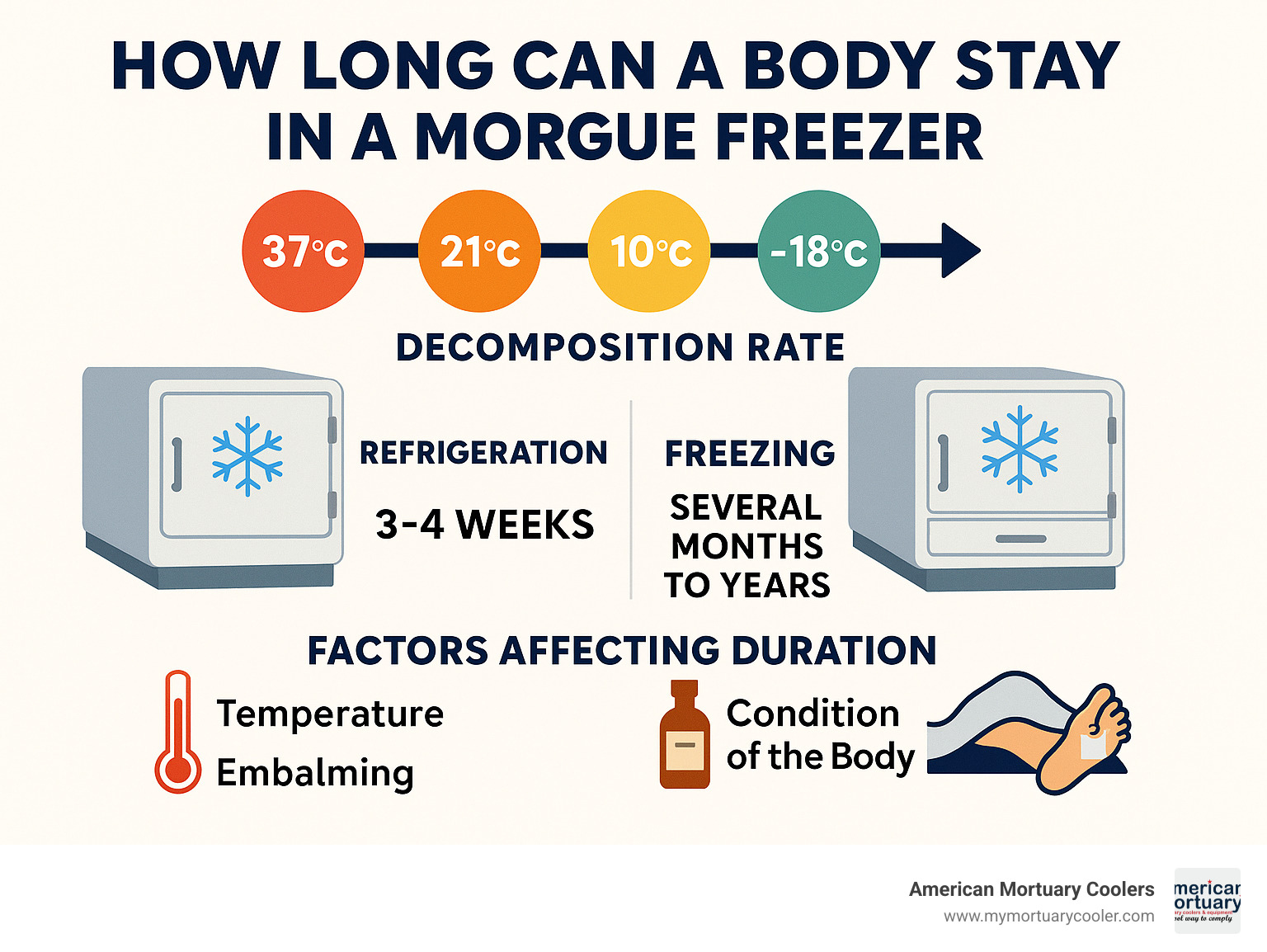
Understanding the terminology in this field can help funeral professionals communicate more effectively with both families and equipment suppliers. Some important terms include morgue drawers which are the individual compartments that hold remains, mortuary refrigeration systems which encompass the entire cooling apparatus, and specimen refrigerators which are specialized units for smaller biological samples.
The preservation timeline isn't just about temperature—it's about honoring those who have passed by maintaining their dignity until final arrangements can be completed. Whether that means a brief stay before a timely funeral or extended preservation for special circumstances, the right equipment makes all the difference in providing this essential service with respect and care.
What Is a Morgue Freezer and How Does It Work?
A morgue freezer (or morgue cooler) is a specialized refrigeration unit designed specifically for the preservation of human remains. Unlike your home refrigerator, these units are engineered with precision in mind - maintaining steady temperatures over long periods with backup systems that ensure they never fail when they're needed most.
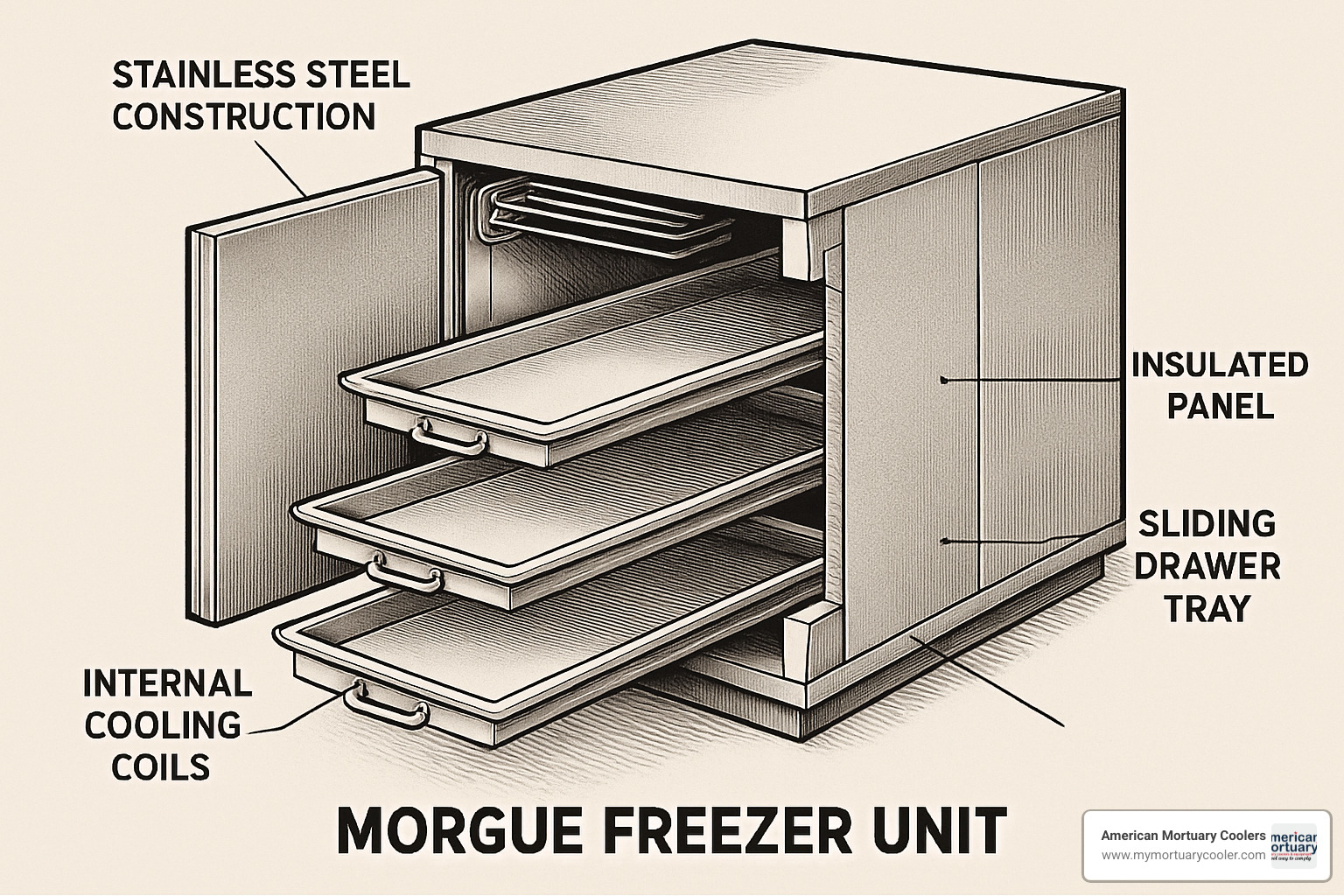
You'll find morgue freezers in various shapes and sizes, from compact portable units designed for a single body to spacious walk-in chambers that can respectfully house dozens of remains. Most feature durable stainless steel construction that's both long-lasting and easy to sanitize, with thoughtfully designed drawer systems that allow for dignified handling.
As Dr. Michael Baden, former chief medical examiner of New York City, explains it: "The primary purpose of cold storage is to slow bacterial growth and enzymatic processes that cause decomposition. Every 10-degree Celsius drop in temperature reduces the rate of decomposition by approximately half."
The science behind these units is straightforward but effective. A powerful compressor drives the refrigeration system, circulating coolant through specially designed evaporator coils that draw heat away from the interior. Carefully engineered air circulation ensures every corner maintains the same temperature, while thick insulation panels keep the cold in and heat out.
How long can a body stay in a morgue freezer depends greatly on the quality of these components working together seamlessly. You can learn more about the specific temperature requirements in our complete guide to morgue cooler temperature standards.
Refrigeration Components 101
The heart of any morgue freezer is its refrigeration system. Understanding these key components helps explain why these units can preserve remains for extended periods:
The compressor system serves as the powerhouse of the unit. These are typically more robust than what you'd find in commercial refrigerators, ensuring they can quickly recover proper temperatures after doors are opened during body transfers or viewings.
Evaporator coils do the heavy lifting of extracting heat from the interior air. In quality morgue freezers, these components are specially designed to resist frost buildup that could compromise cooling efficiency over time.
The insulation panels might not seem exciting, but they're critical. High-density polyurethane foam (usually 60-80mm thick) creates an exceptional thermal barrier, limiting heat transfer to about 8 W/m² as recommended by industry standards.
Precise temperature control systems monitor conditions constantly, with digital controllers maintaining temperatures within ±1°C of the setpoint. Multiple temperature probes are strategically placed throughout the chamber to ensure consistent cooling.
Finally, comprehensive alarm systems provide peace of mind with visual and audible alerts for any temperature fluctuations, power failures, or doors left ajar.
Research published in the National Library of Medicine confirms that "Refrigeration at temperatures between 2°C and 4°C significantly reduces bacterial proliferation and enzymatic activity, effectively slowing decomposition without causing tissue damage from freezing." For more scientific insights, you can review research on refrigeration of corpses.
Safety & Maintenance Essentials
Proper maintenance isn't just about equipment longevity—it directly impacts how long a body can stay in a morgue freezer while maintaining dignity and integrity.
Backup power systems are non-negotiable for facilities housing morgue freezers. Most install emergency generators or battery backups to maintain cooling during unexpected power outages, protecting both the deceased and the facility's reputation.
Modern units include programmed defrost cycles that prevent ice buildup on evaporator coils without significantly raising interior temperatures that could compromise preservation.
Continuous temperature monitoring systems track and log any variations, providing important documentation for quality assurance and compliance with regulations that govern human remains storage.
Regular sanitation protocols using hospital-grade disinfectants prevent cross-contamination and odor buildup, maintaining a respectful environment for both the deceased and those who work with them.
Quarterly preventive maintenance checks of compressors, door seals, and control systems help prevent unexpected failures when they matter most. Learn more about maintaining these critical systems in our guide to Essential Safety Protocols.
At American Mortuary Coolers, we've seen how proper care can extend the reliable service life of morgue freezers from the typical 10 years to 15+ years, ensuring they provide consistent, dignified preservation throughout their lifespan.
How Long Can a Body Stay in a Morgue Freezer?
When families ask us how long can a body stay in a morgue freezer, we always explain that there's no one-size-fits-all answer. The preservation timeline depends primarily on two factors: the temperature maintained and whether additional preservation methods like embalming have been used alongside refrigeration.
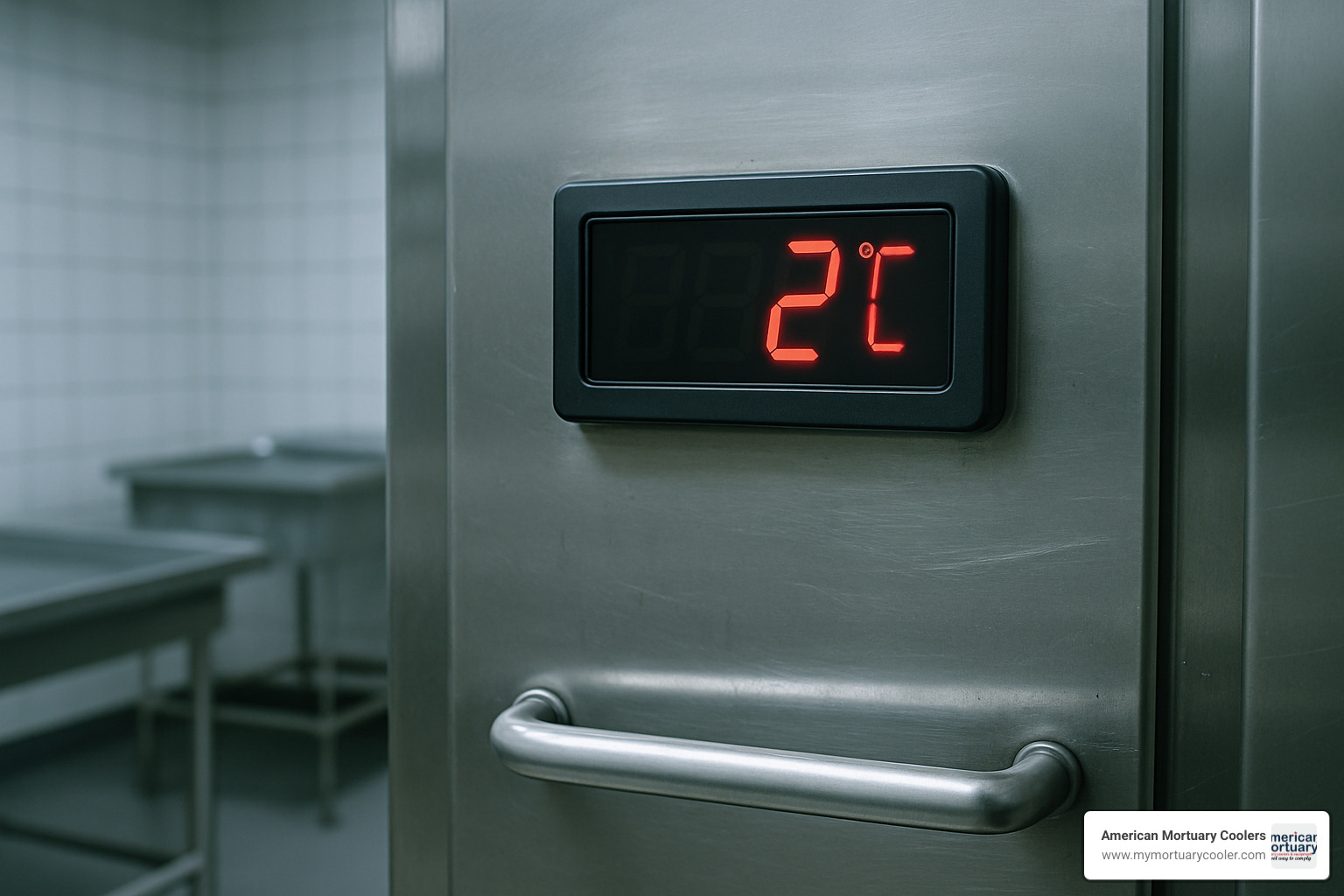
Typical 0–4 °C Storage Window
Most standard morgue refrigerators operate between 0-4°C (32-39°F), which hits a sweet spot—cold enough to significantly slow decomposition without freezing tissues. At these temperatures, families and funeral directors can generally expect:
An unembalmed body typically remains in good condition for about 3-4 weeks, giving families ample time to make arrangements and gather from distant locations. This is why hospital morgues and most funeral homes rely on this temperature range for their day-to-day operations.
"Refrigeration at proper temperatures can preserve a body long enough for most funeral arrangements, even when families need extra time for relatives to travel from overseas," explains funeral director Thomas Lynch, author of "The Undertaking."
What's particularly valuable about this temperature range is that family viewing remains viable throughout this period with proper preparation. However, refrigeration slows but doesn't completely stop nature's processes. Bodies stored at this temperature will eventually show signs of change, particularly if they weren't in optimal condition when they arrived at the facility.
Extended −20 °C Freezing Limits — how long can a body stay in a morgue freezer
When longer preservation is needed, specialized forensic freezers maintain temperatures between -10°C and -20°C (14°F to -4°F). These colder conditions create a dramatic difference in how long remains can be preserved:
Bodies can be maintained in recognizable condition for 6 months to several years—a necessity for disaster management scenarios or when dealing with unidentified remains. The sub-zero environment dramatically slows tissue degradation by essentially pausing bacterial activity.
Forensic pathologist Dr. Judy Melinek, author of "Working Stiff," explains it this way: "Freezing essentially halts bacterial decomposition by solidifying water in the tissues, preventing bacterial mobility and enzymatic reactions. However, cell damage from ice crystal formation can affect tissue quality over very long periods."
We've seen this extended preservation capability become crucial for medical research, teaching facilities, and in situations where legal identification may take months or even years.
The importance of proper freezer function was tragically highlighted in a 2023 New York Times report about a cruise ship where a morgue freezer malfunction led to improper storage of a deceased passenger. In that case, the body was reportedly moved to a drinks cooler, resulting in significant decomposition over just six days—a sobering reminder of how critical proper freezing conditions are to preservation.
At American Mortuary Coolers, we understand that reliable temperature control isn't just about equipment specifications—it's about providing families and professionals with the precious gift of time during difficult circumstances.
Key Factors That Influence Preservation Duration
When families ask how long can a body stay in a morgue freezer, the answer involves more than just temperature settings. Think of preservation like a puzzle with multiple pieces that all need to fit together perfectly.
Initial Body Condition
The starting condition of the deceased plays a huge role in preservation success. It's similar to freezing vegetables from your garden – the fresher they are when frozen, the better they'll be later.
Bodies that receive prompt refrigeration after death simply preserve better than those with delayed cooling. This is why hospitals and medical examiners work quickly to transfer remains to appropriate cooling.
Unfortunately, certain conditions present special challenges. Pre-existing infections or sepsis can accelerate decomposition even in cold environments. Similarly, traumatic injuries can introduce additional bacteria that continue their activity despite refrigeration. And if the deceased was exposed to heat or humidity before cooling began, decomposition processes may already be too advanced for optimal preservation.
Body Mass and Composition
We're all built differently, and those differences matter when it comes to cooling efficiency. Larger individuals naturally cool more slowly, which means decomposition processes have more time to advance before the core temperature drops sufficiently.
Body composition matters too. Those with higher body fat percentages have natural insulation that works against quick cooling – the same principle that helps people survive in cold water longer can actually work against preservation efforts. On the flip side, thinner individuals with less body mass cool more quickly, potentially extending their preservation time.
Muscle tissue, with its higher water content, freezes differently than fatty tissue, creating another variable that affects how long can a body stay in a morgue freezer.
Embalming + Freezing Synergy — how long can a body stay in a morgue freezer
When families need extended preservation – perhaps for relatives traveling from overseas – combining embalming with refrigeration offers the best solution.
Arterial embalming with formaldehyde-based fluids does double duty: it destroys bacteria and chemically fixes tissues to resist decomposition. Cavity embalming addresses internal organs where decomposition typically begins first. Some cases benefit from re-aspiration – the removal of gases and fluids that develop post-embalming – to extend preservation even further.
As Melissa Johnson Williams, Executive Director of the American Society of Embalmers, notes, "The combination of proper embalming followed by refrigeration can extend preservation by weeks or even months beyond what either method alone could achieve."
This combined approach is particularly valuable for open-casket services that must be delayed significantly due to family circumstances or international arrangements.
Equipment Reliability & Monitoring
Even the best preservation methods fail without reliable equipment. Temperature consistency matters tremendously – fluctuations accelerate decomposition even if the average temperature seems appropriate.
The quality of door seals and insulation directly affects temperature stability. And because power outages happen, backup systems are essential to ensure continuous preservation. That's why at American Mortuary Coolers, we recommend digital monitoring systems that track temperature continuously and alert staff to any deviations outside acceptable ranges.
Think of it like medication that must be taken at regular intervals – missing doses or taking them irregularly reduces effectiveness. Similarly, temperature fluctuations reduce the effectiveness of refrigeration preservation.
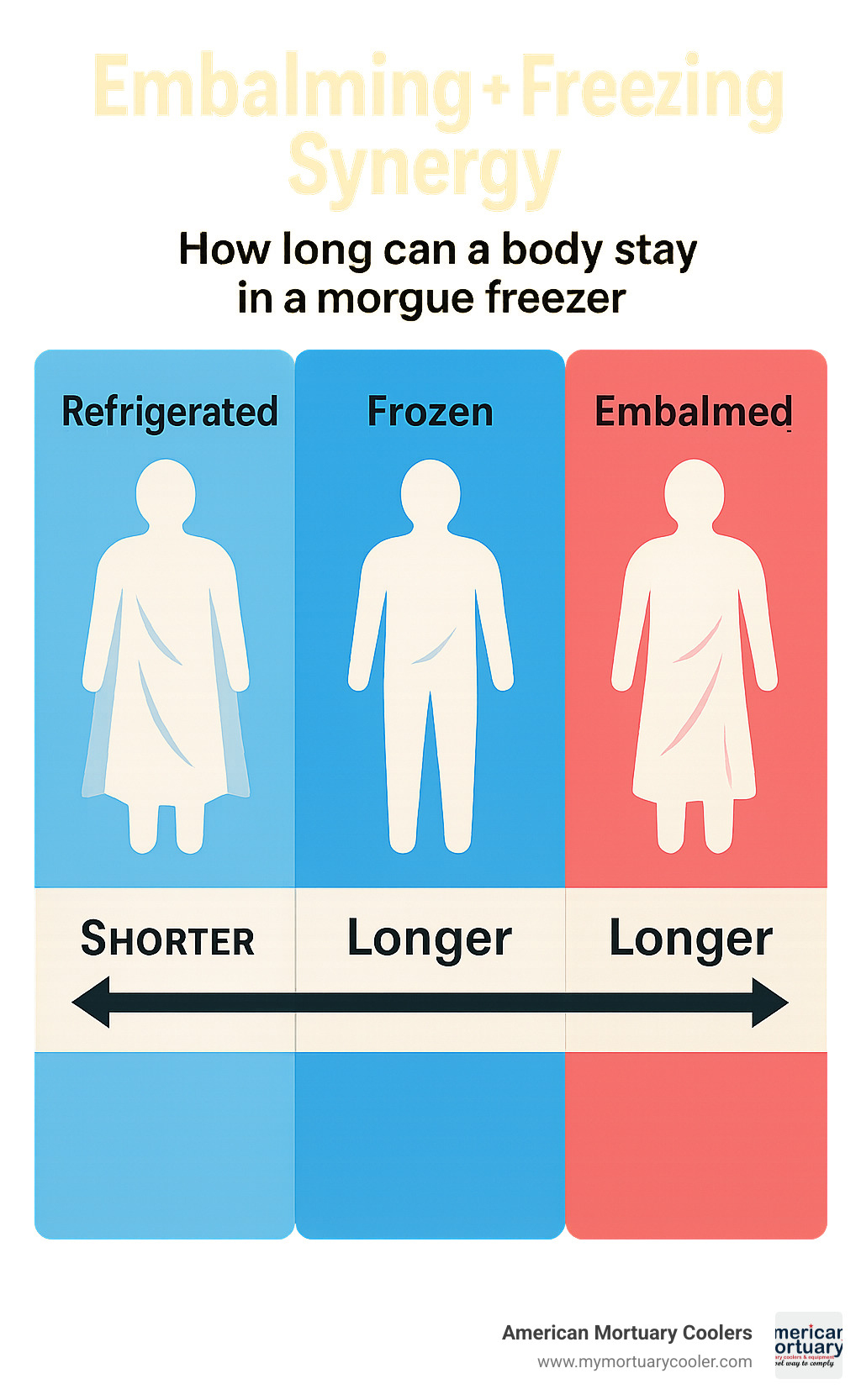
Legal, Cultural, and Practical Limits
Beyond the physical capabilities of morgue freezers, various regulations and considerations govern how long can a body stay in a morgue freezer.
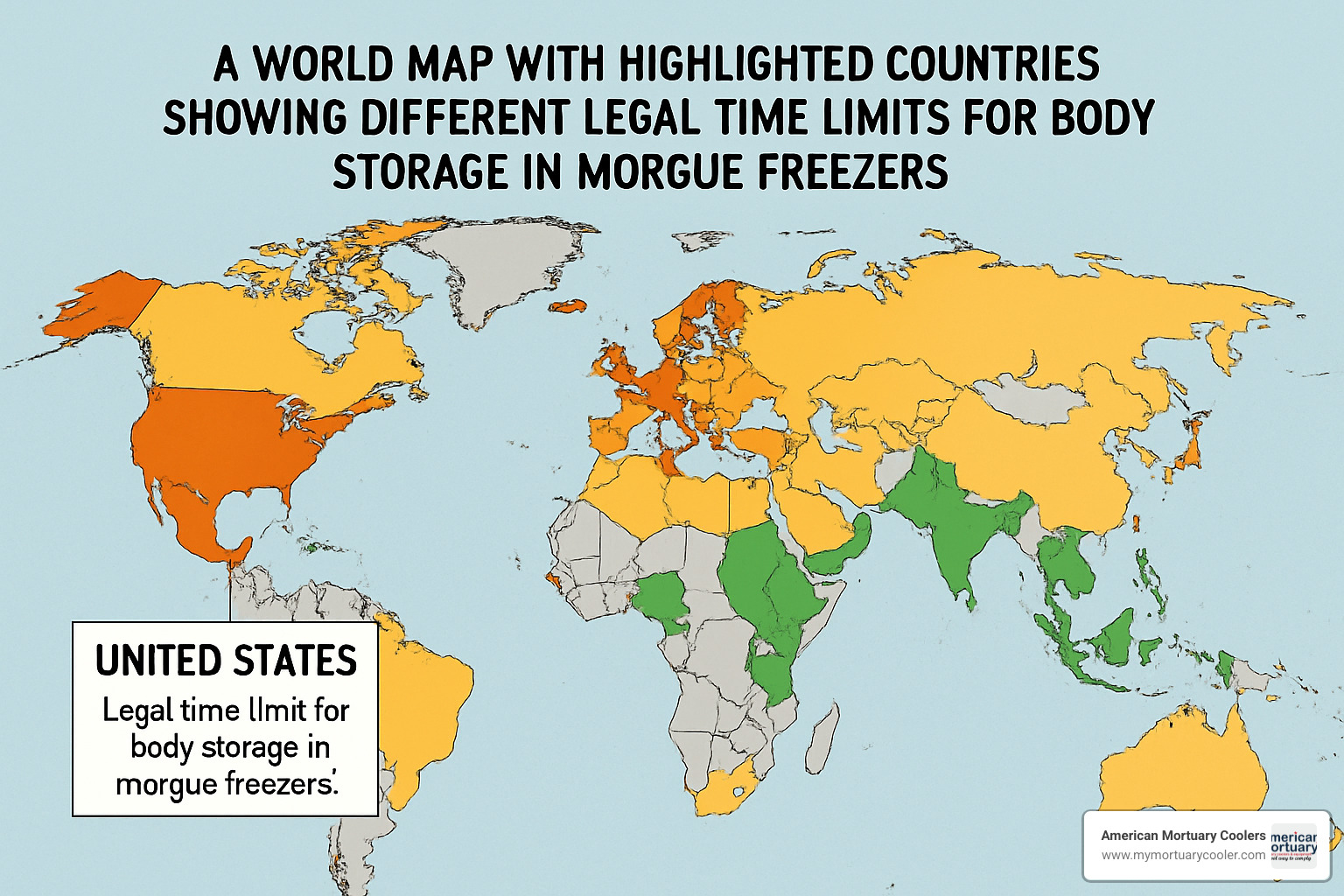
State and Local Regulations
The legal landscape around body storage varies dramatically depending on where you live. Most states require that bodies be refrigerated or embalmed within 24-48 hours after death if final arrangements aren't imminent. This isn't just bureaucracy at work—it's a practical public health measure.
Pennsylvania and New Jersey take a stricter approach, mandating refrigeration or embalming within just 24 hours. North Dakota stands out with its unusual prohibition on refrigeration entirely, coupled with an 8-day disposition deadline. Meanwhile, Washington DC offers a more flexible window, allowing bodies to be held for up to a week before disposition is required.
"While there is no federal law governing body storage times," explains a representative from the National Funeral Directors Association, "state regulations typically focus on public health concerns rather than imposing arbitrary time limits." This practical approach allows for necessary flexibility while protecting community wellbeing.
Oregon takes a unique monitoring approach, requiring funeral homes to report any bodies held over 10 days. These reporting requirements help prevent situations where remains might be forgotten or improperly stored for extended periods. For families wondering about how long can a body stay in a morgue freezer in their state, checking local regulations is an essential first step in planning.
Autopsy and Legal Holds
When the legal system becomes involved, timeframes often extend considerably. Bodies subject to medical examiner investigations typically undergo autopsy within 2-3 days, but may remain in storage until the investigation concludes and the family can make arrangements.
Criminal cases add another layer of complexity. Bodies that are evidence in active investigations may remain in morgue freezers for extended periods—sometimes months or even years in extreme circumstances. The preservation needs in these situations often drive facilities to invest in higher-quality freezing units that can maintain optimal conditions for longer periods.
Similarly, when disasters result in multiple casualties, morgue facilities may need to accommodate remains for extended periods while the painstaking work of identification continues. In these situations, how long can a body stay in a morgue freezer becomes a question of both technical capability and investigative necessity.
Unidentified Remains
For the heartbreaking cases of unidentified persons, most jurisdictions establish specific protocols that balance dignity with practical constraints. Standard holding periods typically extend at least 30 days before any disposition decisions are made, giving authorities time to establish identity and locate next of kin.
Thankfully, only about 1% of deaths result in truly unclaimed remains after standard holding periods. In these cases, some jurisdictions maintain remains for years, hoping for eventual identification through advancing technologies or new information. The development of advanced freezing technology has made such long-term storage both more feasible and more common.
Many medical examiners' offices partner with organizations like the National Missing and Unidentified Persons System (NamUs) to help resolve these cases, even years after death. For these situations, understanding how long can a body stay in a morgue freezer becomes critically important to maintaining viable evidence for future identification efforts.
Financial Considerations
The practical realities of storage costs also influence how long bodies remain in morgue freezers. Daily or weekly storage fees typically apply after an initial grace period, with private mortuary storage costs ranging widely from $35 to $100 per day. These costs reflect not just the space occupied but the significant energy consumption required for continuous refrigeration.
Hospital morgues, with their limited capacity, typically transfer bodies to funeral homes or medical examiner facilities quickly—often within 3-5 days. This quick turnaround helps hospitals maintain capacity for new cases while transferring remains to facilities better equipped for longer-term storage.
For families navigating funeral arrangements on tight budgets, these storage costs can create additional pressure during an already difficult time. Understanding these potential expenses is an important part of the conversation around how long can a body stay in a morgue freezer. Many funeral homes offer payment plans or assistance programs to help families manage these unexpected costs.
For more detailed information about refrigeration timeframes before burial, visit our guide on Keeping Cool before burial.
Consequences of Freezer Failure
Equipment reliability isn't just a technical consideration—it has profound implications for dignity and public health. When freezer systems fail, the consequences can be immediate and serious. Temperature increases of just a few degrees can accelerate decomposition significantly, with bacterial growth resuming rapidly once temperatures rise above 4°C.
"We had a freezer compressor fail over a holiday weekend," shared one forensic technician with over 20 years of experience. "Despite backup systems, we lost optimal preservation for nearly 12 hours. The difference in tissue quality was immediately noticeable, particularly in cases that had been stored for extended periods."
These situations can create not just practical problems but potential legal liability if preservation fails due to equipment issues. This is why quality equipment with redundant systems isn't just a luxury—it's an essential investment for facilities responsible for remains. Every facility should establish emergency transfer protocols to quickly relocate remains if primary systems fail.
Cultural & Religious Considerations
The deeply personal nature of death means cultural and religious traditions often play a defining role in how remains are handled. Islamic tradition generally calls for burial within 24 hours of death, while Jewish custom similarly favors prompt burial, typically within 24-48 hours. Some Buddhist traditions include a period of meditation near the body for several days, while Hindu customs often require cremation within 24 hours.
These religious requirements typically take precedence over extended storage, though exceptions are made for legal investigations, international transport, or other practical necessities. Funeral directors and morgue managers often work closely with religious leaders to find appropriate compromises when circumstances require deviation from traditional practices.
International repatriation presents particular challenges, often requiring specialized freezing and embalming to comply with transportation regulations while respecting religious preferences. For families arranging transport of loved ones across borders, understanding how long can a body stay in a morgue freezer becomes an essential part of planning a dignified return home.
Frequently Asked Questions about Morgue Freezer Storage
How long can an unembalmed body be held before odor becomes an issue?
When families ask about odor concerns, I always reassure them that modern morgue freezers are specifically designed to address this. In a properly maintained unit at 2-4°C, odor typically stays controlled for 3-4 weeks for an unembalmed body.
If you're using freezing temperatures (-10°C to -20°C), you can effectively halt odor development for months. The science is straightforward – cold temperatures dramatically slow bacterial activity, which is what causes decomposition odors.
It's worth noting that once removed from refrigeration, an unembalmed body will begin developing noticeable odors within hours as bacteria wake up and resume their natural processes.
As mortuary scientist Dr. Robert Deters explains, "Odor control is directly related to bacterial activity. By maintaining temperatures below 4°C, we dramatically slow the metabolic processes of odor-producing bacteria, but they resume activity quickly once warming occurs."
For funeral homes particularly concerned about managing odors, we at American Mortuary Coolers offer specialized ventilation and filtration systems designed specifically for mortuary environments – just one way we help professionals maintain dignity throughout the preservation process.
Can families request freezing instead of embalming to save costs?
Absolutely – and this is becoming increasingly common as families seek more natural and economical options. Refrigeration often serves as a more affordable alternative to embalming, especially when:
- The family isn't planning an open-casket service
- Cremation will be the final disposition
- The funeral will happen relatively quickly (within a week or two)
- Religious traditions or personal values favor minimal intervention
I always encourage funeral directors to have an honest conversation with families about the differences. Refrigeration alone won't provide the same level of preservation as embalming for open-casket viewing, particularly if services will be delayed more than a week.
Sarah Wilson, a funeral director I worked with recently, put it beautifully: "We always discuss the differences between refrigeration and embalming with families. For some, the natural approach of refrigeration aligns with their values, while others prefer the additional preparation and preservation embalming provides, especially when services are delayed."
How long can a body stay in a morgue freezer becomes particularly relevant when families choose refrigeration-only preservation, as timing becomes more critical to the memorial planning process.
What happens to bodies that remain unclaimed after the legal holding period?
This is one of the more poignant aspects of our profession. The procedures vary by location, but most jurisdictions follow a similar path with unclaimed remains:
First, the facility makes genuine efforts to locate family members, typically for at least 30 days. If no one comes forward, the local government (usually county or municipality) takes responsibility. Most places provide a simple burial or cremation at public expense, maintaining records indefinitely should family later come forward.
In cases with unidentified remains, how long can a body stay in a morgue freezer becomes especially important – these individuals may remain in freezer storage for years during identification efforts.
The National Missing and Unidentified Persons System reports that approximately 4,400 unidentified bodies are recovered annually in the United States. Many communities have developed dignified approaches to handling these situations. For example, Cook County Medical Examiner's Office holds quarterly interment services for unclaimed remains, providing respectful disposition while preserving records for potential future identification.
How does temperature fluctuation affect preservation quality?
Temperature stability isn't just important – it's absolutely critical for preservation. Even brief fluctuations can jump-start decomposition processes. The main culprits include door openings causing temporary temperature spikes, power interruptions leading to warming, overloaded units struggling to maintain consistent cooling, and seasonal ambient temperature changes affecting overall efficiency.
That's why modern morgue freezers include sophisticated temperature logging and alert systems. At American Mortuary Coolers, we design our units with redundant cooling systems and battery-backed temperature monitors specifically to ensure preservation quality remains consistent, even under challenging conditions.
When considering how long can a body stay in a morgue freezer, the stability of that freezer's temperature is just as important as the temperature itself – something we emphasize in all our training materials.
Is there a difference between hospital morgue freezers and funeral home coolers?
There certainly is, and understanding these differences helps facilities choose the right equipment. Hospital morgues typically use higher-capacity units designed for shorter-term storage (days to weeks), while funeral homes often employ smaller, more energy-efficient units for bodies awaiting services.
Medical examiner facilities frequently require specialized forensic freezers capable of much longer preservation, and research institutions might use ultra-low temperature freezers for specific scientific applications.
While the fundamental refrigeration principles remain consistent across these applications, the capacity, temperature range, and features vary significantly based on each facility's specific needs. That's precisely why we at American Mortuary Coolers focus on custom solutions rather than one-size-fits-all approaches – because every facility has unique requirements for answering the question of how long can a body stay in a morgue freezer.
Conclusion
Understanding how long can a body stay in a morgue freezer involves considering multiple variables: temperature settings, initial body condition, preservation methods, equipment reliability, and regulatory requirements. While standard refrigeration at 2-4°C provides weeks of preservation, specialized freezing at -20°C can extend this to months or years for forensic, research, or identification purposes.
The science of body preservation continues to evolve, with advances in refrigeration technology offering increasingly reliable and energy-efficient solutions. However, the fundamental principles remain unchanged: lower temperatures slow decomposition by reducing bacterial activity and enzymatic processes.
For funeral homes, medical examiners, and hospitals seeking to optimize their preservation capabilities, selecting the right equipment is crucial. American Mortuary Coolers specializes in custom solutions custom to specific facility needs, with options ranging from single-body portable units to walk-in chambers with advanced monitoring systems.
Whether you need short-term refrigeration for a community funeral home or long-term forensic preservation capabilities, understanding the science and limitations of morgue freezer storage helps ensure dignified care for the deceased and peace of mind for families during difficult times.
Our team at American Mortuary Coolers is available to consult on your specific preservation requirements, with service across our regional locations in Johnson City TN, Atlanta GA, Chicago IL, Columbia SC, Dallas TX, Los Angeles, New York NY, Pittsburgh PA, and throughout the Midwest, Northeast, Rocky Mountain, Southeast, Southwest, and Pacific regions.



